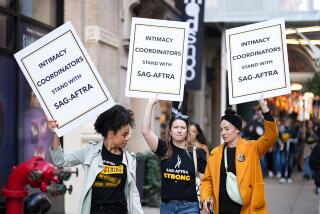Artists Put Pressure on for Benefits
- Share via
Twelve years ago, Motown diva Mary Wells was so sick and destitute that she checked into a charity ward of County-USC Medical Center.
Diagnosed with throat cancer, the 48-year-old former pop star had no health insurance and no pension to provide for her four young children.
“Despite the millions of dollars the industry made off of my mother’s music, there she was, the ‘First Lady of Motown,’ abandoned to die in a county sick bed,” said Stacy Womack, daughter of the late singer whose death from cancer sparked a burgeoning artist rights movement. “There is no safety net in this business.”
After Wells died, her family joined soul singer Sam Moore of Sam and Dave fame, the estates of Jackie Wilson and Curtis Mayfield, and other artists in 1993 to sue a branch of the American Federation of Television & Radio Artists union for failing to provide them with adequate health and retirement benefits.
The musicians accused AFTRA Health and Retirement Funds of breach of fiduciary duty and violating federal pension laws by failing to ensure that record companies pay contributions into their benefits plan. They also sued all the major record companies.
AFTRA, based in Washington, is the union that represents music acts that sign with major labels.
In the last decade, other artists have joined the legal battle. But reaching a settlement in the case has proved difficult. One problem is that the AFTRA fund is a separate entity from the union, and the organizations disagree on how to settle the case.
In March, trustees for the AFTRA fund, which has nearly $2 billion in assets, proposed an $8-million settlement to resolve the case for 20,000 artists, most of whom would receive only a couple hundred dollars under the agreement.
“I’m going to fight this thing to my last living breath,” said soul star Moore. “The trustees are trying to give us a little shut-up money to make us go away. Not me. I’ve been fighting nine years to right this wrong. I’m not giving up now.”
The Recording Artist Coalition, a recently formed trade group composed of more than 100 top acts, filed a brief in U.S. District Court in Atlanta on Thursday opposing the settlement.
And complicating things further was a legal brief filed by AFTRA union officials opposing the settlement proposal as “manifestly unfair to artists.” The move comes as AFTRA is trying to renegotiate a three-year contract to represent recording artists with the world’s five largest music corporations.
Hilary Rosen, chairman of the Recording Industry Assn. of America, which represents the five largest music corporations, said: “AFTRA officials are going through a problem similar to what the current management at record companies are going through, which is how can you truly pay for the sins of your father if there are no adequate records to know the facts of the sin.”
Moore and other artists are challenging a business model in which low-level employees at record companies receive better benefits than the artists whose music they sell. Moore said artists who create the product on which the industry thrives are tired of being treated like freelancers and left to fend for themselves.
Moore, 66, said he still must go on tour each year to make ends meet.
Moore and other former big stars said the AFTRA fund’s trustees have neglected to police record-label contributions to benefit accounts and failed to perform audits and sue companies caught violating federal pension laws.
To qualify for benefits under the AFTRA arrangement, artists are required to produce royalty statements proving they earned $7,500 to $15,000 a year.
Those who qualify get some health insurance and monthly pension checks.
But unlike salaried radio and television employees who also are covered by AFTRA, recording artists have more difficulty substantiating their income because royalty calculations often are a convoluted practice in the record business.
Record labels typically pay artists an advance after they sign a contract. Artists are, however, required to repay the advance and reimburse the label for costs associated with studio recording, video production, touring and radio promotion before earning a penny in royalties.
Record companies also deduct packaging fees and pay reduced royalty rates for albums sold overseas and in record clubs. In most cases, artists don’t receive a royalty check for years.
Disputes over royalty payments are common in the music business. In the past, major stars have uncovered hundreds of thousands of dollars in missing royalties after they audited their record labels’ books.
And music industry consolidation has complicated the issue. Many bookkeeping records have been lost or destroyed as artist catalogs have been bought and sold numerous times over the last four decades in a spate of mergers and acquisitions.
In the early 1990s, several music corporations acknowledged underpaying blues and soul stars and increased royalty rates on future CD sales.
That action, however, did nothing to assist artists in substantiating underpayments by record labels to the AFTRA fund.
The lawsuit filed by Moore and others contends that record companies in the 1950s and 1960s did not accurately report all royalty earnings to the AFTRA fund and failed to make the required contributions to their pension accounts.
The current dispute centers primarily on the interpretation of language in a collective bargaining agreement between the record labels and AFTRA from 1959 to 1995, which established how much music companies were required to contribute to the AFTRA fund.
As a result of the lawsuit, the disputed language in the collective bargaining agreement was renegotiated by the parties in 1995 to more clearly define the record companies’ contributions to health and other benefit plans for artists.
AFTRA fund trustees do not plan to tap into any of the organization’s $2 billion in assets to resolve the case. Trustees intend to use $8 million from an insurance policy to settle the dispute--about $2 million of which would go directly to the plaintiffs’ lawyers.
Under the proposal, the trustees have offered the 15 named plaintiffs in the suit about $100,000 each. A number of musicians, including Jerry Butler and Lester Chambers, intend to accept the offer.
Others, including Moore and the estates of Wells and Wilson, have been fighting the settlement, contending that it prevents former stars from recovering benefits.
Last week, opponents of the settlement acquired a powerful new ally in Greg Hessinger, the national executive director of AFTRA. Hessinger, who also is an AFTRA fund trustee, deems the settlement unfair because it would “sacrifice the rights of thousands of artists” and “deprive [them] of fundamental rights of due process.”
A hearing on the proposed settlement is scheduled to take place in the District Court in Atlanta on June 20--just 10 days before AFTRA’s collective bargaining deal with the major labels expires.
Recently, AFTRA proposed that in the future music companies should be required to contribute a fixed annual amount to the AFTRA fund to help prevent lapses in benefit coverage for artists.
AFTRA representatives said the industry, which generates more than $32 billion in annual global sales, will need to collectively contribute at least $20 million over the next three years to help bolster health-care and pension coverage for artists in the future.
“It’s a relatively small investment in talent for the record labels that could provide a very effective way to give artists peace of mind, which will permit them to focus on creating music the public can enjoy--and purchase,” Hessinger said in an interview. “It’s a benefit plan that offers continuous protection for artists and makes good business sense for music companies.”
More to Read
The biggest entertainment stories
Get our big stories about Hollywood, film, television, music, arts, culture and more right in your inbox as soon as they publish.
You may occasionally receive promotional content from the Los Angeles Times.










